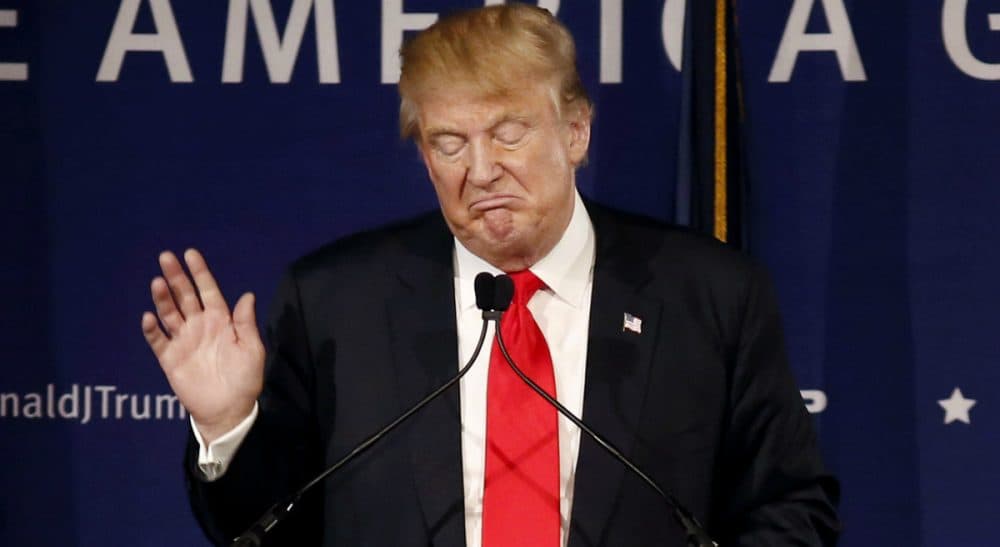Advertisement
Everybody Just Calm Down: Putting A Trump Presidency In Perspective

President Trump.
President Donald J. Trump. Leader of the free world. Heir to Washington, Lincoln, Roosevelt and Reagan.
The words catch in your throat like swallowed sand. An impossibility, you think, and perhaps you are right. But the prospect is worth considering. Just what kind of president would Donald Trump make?
First off, thank God for the Constitution.
Actually, of course, a Deity was uninvolved (unless you’re Ted Cruz, in which case the Creator dictated every line). But the men who framed that very political document were deeply suspicious about potential tyranny from a centralized government. As a result, the Constitution fragments power among three branches (and then further, between two legislative houses). And even if there is consensus, the Bill of Rights imposes sharp boundaries that can’t be crossed absent an amendment. States continue to maintain their own levels of sovereignty — a fact recognized in the (admittedly, poorly understood) 10th Amendment — putting further limits on what the national government can do. Moreover, America is a country of laws that (the assertions of steamy episodes of "Scandal" notwithstanding) even a president can’t break. Thus, for example, Trump’s claim he’d make soldiers violate U.S. laws when it comes to torture will never happen.
A President Trump will discover -- as have many presidents before him -- just how weak his office really is.
For many, the Constitution’s complexity has been viewed as a flaw. They long for some sort of parliamentary system where the head of government is also the head of the party in power and it’s easy to push through all manner of novel ideas such as single-payer health care or paid parental leave.
But should Trump take the oath of office Jan. 20, 2017, I suspect those flaws will suddenly look like virtues. A President Trump will discover — as have many presidents before him — just how weak his office really is. Yes, there’s wider latitude when it comes to foreign affairs. But when it comes to domestic matters, little happens unless Congress and the courts are willing to play along. For that reason alone, I’d advise holding off on that new-home purchase in Saskatchewan. At worst, it’s only eight years.
Thus the Constitution can help limit the damage. But will Trump as president be as bad as feared? Perhaps not.
I say this with trepidation, since to allow that Trump may not be America’s Hitler is for many some sort of heresy. So for the record, let me stipulate: I would never vote for the guy. I find his expressed attitudes towards minorities, immigrants and women deeply offensive (although, to be fair, his attitudes are no less offensive than those held by many of the other GOP candidates — it’s just that Trump is blunter than them in his language). Moreover, I find his vagueness in policy, his stooping to the gutter and his many provocations (including near incitements to violence) disturbing and unbecoming in any serious presidential candidate.
Having said that, though, there are two related arguments that undercut worries about Trump’s seeming extremism.
The first is that the man is no extremist at all — he’s just unprincipled, without any core beliefs. It’s a claim made by many of his competitors and it’s likely true. On the hustings, Trump knows well how to throw red meat to the anti-establishment wolves baying for change. But what he’s offered up is little more than an attitude. There are no policy specifics precisely because Trump really doesn’t care much about policy; he’s anything but an ideologue. A good idea comes along and he’ll latch on to it. I suspect that once in office members of Congress will find him a pragmatist, far more accommodating than they would have suspected.
Second, Trump is a negotiator. Negotiators want to get things done — they want a deal — and part of the shtick is to open with an outlandish position and then compromise down to something more reasonable. Allegedly, Trump made this explicit when discussing immigration during an off-the record interview with the New York Times editorial board. I suspect it’s the same with other issues as well.
I’d advise holding off on that new-home purchase in Saskatchewan. At worst, it’s only eight years.
Combine these two elements — pragmatism and deal-making — and one might well see Trump emerge as a relatively effective, and also middle-of-the-road, president. His current efforts to reach out to establishment Republicans suggest that, his rhetoric notwithstanding, he wants to pass his time in Washington as something more than just a gadfly. That should please those who now fear him. On the other hand, it might very much displease those who now support him.
Of course, there are other elements of the Trump personality that still leave one worried. He’s a one-man show, vying for a job where it’s high quality staff and cabinet secretaries that can make or break you. His attachment to the truth is slippery; a la his claim of New Jersey residents cheering 9/11, he seems genuinely to believe stuff that others laugh off. His brashness and rudeness might hurt the U.S., especially in its dealings with other world leaders.
Moreover, my sense that Trump is a pragmatist and deal-maker might be too generous. Perhaps he really will be as unhinged as president as he has appeared on the campaign trail. If that’s the case, perhaps a move to Canada might be worth exploring after all.
